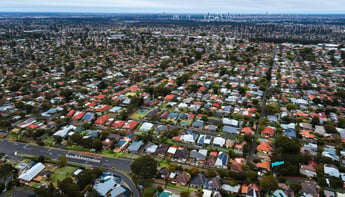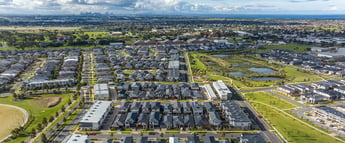Written by

Melbourne is one of Australia’s most dynamic cities, with a robust real estate market that offers opportunities for long-term capital growth and rental yields. But with so many suburbs to choose from, it’s essential to know which areas are primed for growth. In this blog, we’ll explore the top suburbs to invest in Melbourne, based on factors like location, infrastructure, amenities, and investment potential.
Mickleham
Location: North, ~32 km from CBD
Why Invest: Mickleham is a fast-growing suburb in Melbourne’s outer north, making it an emerging hotspot for investors. With significant infrastructure developments, new schools, parks, and shopping centers being planned, Mickleham offers strong capital growth potential at an affordable entry price.
Median house price: $682,750
Weekly median rent: $532
Population: 17,452
Number of private dwellings: 5,681
Wollert
Location: North, ~26 km from CBD
Why Invest: Wollert is an emerging suburb with new housing estates and plenty of infrastructure development. For investors looking for an affordable investment property in Melbourne, Wollert offers great potential for long-term growth as more amenities are established. Visit Mason Quarter for investment opportunities in Wollert.
Median house price: $683,950
Weekly median rent: $580
Population: 24,407
Number of private dwellings: 7,989
Tarneit
Location: West, ~25 km from CBD
Why Invest: Tarneit has become one of the most sought-after suburbs in Melbourne’s west due to its affordability and excellent connectivity. With regular train services to the CBD and ongoing infrastructure upgrades, Tarneit is an ideal choice for investors looking for high rental demand and future capital growth.
Median house price: $645,000
Weekly median rent: $530
Population: 56,370
Number of private dwellings: 17,274
Rockbank
Location: West, ~29 km from CBD
Why Invest: Rockbank is quickly emerging as a promising area for investors due to its affordability and rapid growth. With plans for new schools, retail spaces, and transport infrastructure, Rockbank is ideal for those seeking long-term capital growth. As more families move to the area, rental demand is increasing, making it a solid option for property investors.
Median house price: $620,000
Weekly median rent: $480
Population: 2,583
Number of private dwellings: 1,057
Wyndham Vale
Location: West, ~31 km from CBD
Why Invest: Wyndham Vale is another fast-growing suburb in Melbourne’s west. With new housing estates, improved train links, and the ongoing development of local amenities, it offers significant potential for capital growth. Investors are drawn to the area for its affordability and increasing rental demand, making it one of the top emerging suburbs to invest in Melbourne.
Median house price: $585,000
Weekly median rent: $470
Population: 20,518
Number of private dwellings: 7,267
Fraser Rise
Location: North-west, ~25 km from CBD
Why Invest: Fraser Rise is a relatively new suburb that’s quickly gaining popularity due to its affordable property prices and family-friendly environment. With continued development, Fraser Rise is an excellent option for investors looking for growth potential in Melbourne’s north-west. Visit Clara Place for investment opportunities in Fraser Rise.
Median house price: $705,000
Weekly median rent: $530
Population: 9,097
Number of private dwellings: 2,869
Frankston
Location: South, Bayside, ~40 km from CBD
Why Invest: Frankston is one of the top suburbs to invest in Melbourne if you’re looking for an affordable coastal location with growth potential. The suburb is becoming increasingly popular due to its proximity to the Mornington Peninsula and has strong rental demand.
Median house price: $742,500
Weekly median rent: $550
Population: 139,281
Number of private dwellings: 58,774
Werribee
Location: West, ~32 km from CBD
Why Invest: Werribee offers affordable properties and significant infrastructure development, including freeway upgrades and train line extensions. This makes it attractive for investors seeking solid rental yields and future price growth.
Median house price: $610,000
Weekly median rent: $470
Population: 50,027
Number of private dwellings: 19,890
Pakenham
Location: South-east, ~56 km from CBD
Why Invest: Pakenham is one of the top emerging suburbs to invest in Melbourne due to its affordability and rapid development. The area has been expanding with new schools, shopping centers, and transport infrastructure, making it ideal for first-time investors and those seeking long-term growth. With rental demand steadily increasing, Pakenham is well-positioned for future capital appreciation.
Median house price: $655,000
Weekly median rent: $520
Population: 54,118
Number of private dwellings: 20,160
Cranbourne
Location: South-east, ~43 km from CBD
Why Invest: Cranbourne is one of the fastest-growing areas in Melbourne’s south-east. Its affordable housing prices, coupled with extensive infrastructure development, make it a hotspot for both first-time buyers and seasoned investors looking for strong capital growth.
Median house price: $670,000
Weekly median rent: $500
Population: 21,281
Number of private dwellings: 8,073
Williams Landing
Location: West, ~19 km from CBD
Why Invest: Williams Landing is a well-planned suburb with great transport links, including a dedicated train station and easy access to the freeway. The area has seen consistent growth in property prices and offers strong rental demand, making it one of the top suburbs to invest in Melbourne.
Median house price: $790,000
Weekly median rent: $580
Population: 9,448
Number of private dwellings: 3,186
Explore and research your options
When looking to buy an investment property in Melbourne, it’s crucial to choose a suburb that offers both short-term returns and long-term growth potential. The suburbs listed above offer a mix of affordability, rental demand, and infrastructure development, making them some of the top suburbs to invest in Melbourne. Whether you’re a seasoned investor or new to the market, these suburbs provide opportunities for potential solid returns.
Note: The above data insights are courtesy of the Australian Bureau of Statistics (ABS) Census data 2021 and CoreLogic.
Disclaimer: The information provided in this blog post is for informational purposes only and should not be considered financial or investment advice. Real estate investments are subject to various risks and uncertainties. We recommend consulting with a qualified financial advisor or real estate professional before making any investment decisions. Individual circumstances vary, and past performance is not indicative of future results.







